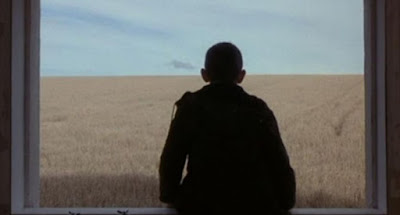It's not unfair to say this career hasn't skyrocketed as one might once have hoped. While Ramsay circumnavigated the one-and-done, two-and-through industry restrictions that stymied her contemporaries Carine Adler (1997's Under the Skin) and Sandra Goldbacher (1998's The Governess), after 2002's Morvern Callar - still her best film, not least for being an exemplary job of adaptation - she struggled to find material worthy of her best images. Repeat viewings exposed 2011's We Need to Talk About Kevin as every bit as preposterous in its paedophobia as the momentary literary sensation it grew from; 2017's You Were Never Really Here, which carried Ramsay to America, felt far too in thrall to Taxi Driver to be healthy for anyone. (At the same time, she was eclipsed domestically by Andrea Arnold, a creative possessed of a comparable sensibility, but warmer and cuddlier with it: all cats and dogs, where Ramsay's sympathies ran towards the verminous.) Yet with Ratcatcher, this director was still working towards a new vocabulary, cutting any last ties with the constraining dogmas of social realism: as when rewatching, say, The Terence Davies Trilogy, you find yourself marvelling that British cinema ever permitted an aesthetic as dreamy and delicate as this to flower. (But then this was post-Four Weddings and Full Monty, when confidence and lottery money were in the air: anything went, including - in the end - that same confidence.) In the presence of deprivation and suffering, Ramsay found mordantly funny images, flashes of defiant life (non-professional kids effing and jeffing, giving debt collectors the runaround and threatening the binmen with a kicking) and - vitally - forms of escape, whether via the frame of an unfinished window or a mouse that soared, a midfilm leap of the cinematic imagination that remains immensely charming and moving, in large part because it indicates Ramsay was herself thinking like a scrappily imaginative child to some degree. In 2024, her adult self is in the wilderness: too many projects that didn't click commercially, many more that didn't even get shot. Ratcatcher is as useful a reminder as any of the artistic benefits to be gained from bringing Lynne Ramsay back in from the cold.
Ratcatcher returns to selected cinemas from tomorrow.

No comments:
Post a Comment